Gap Holds Even When Socio-Economic Status is Controlled For –
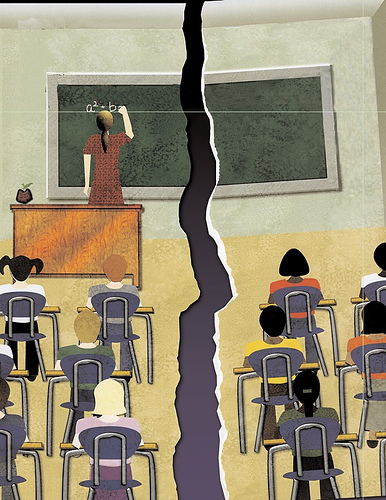
The one area where the gap is closing is only for blacks and only in math. Assistant Superintendent Clark Bryant, who oversees curriculum and instruction for the Davis school district could not explain why that was the case.
The district has put a good deal of focus into closing the achievement gap and they have implemented many of the recommendations of the achievement gap task force. However, as we shall see, much work remains to be done and it must be done during an era of declining resources that may disproportionately impact those students who are considered most at-risk.
These are the overall results for English. The key thing that we can see here is that there is an achievement gap both with regards to race and ethnicity as well as with regards to economic status.
Here we break down the gap by race or ethnicity. We see that in English, black students improved their scores from 16 in 2003 to 33 by 2010. Hispanics from 16 to 33 as well. Whites from 32 to 51 and Asians from 35 to 59. That means that the achievement gap actually has widened in English slightly from 2003 to the present.
We can also see that, while 60 percent of whites and 57 percent of Asians scored in the proficient or advanced range, only 47 percent of blacks and 31 percent of Hispanics scored in that range.
When we drill down into controlling for economic disadvantage, we find perhaps the most stark finding of all. While all “not economically disadvantaged” students score better than their economically disadvantaged counterparts, the achievement gap remains and in fact, is even more pronounced.
Non-economically disadvantaged Asians have a 34-point gap over blacks in English and a 30-point gap over Hispanics. That is larger than the 26 and 23 points gap over the same groups overall. Whites likewise have a 25-point advantage over blacks and a 21-point advantage over Hispanics, larger than the 18- and 15-point advantage, respectively, overall.
Clearly then, in regards to English, there are two gaps, an economic gap and a racial gap. And the surprising aspect is that even controlling for economics, the race and ethnicity gap remains, and in fact is even stronger. This is probably the most disturbing finding, that there is a specific racial gap in Davis.
I think one surprising finding is that in Davis there is no gender gap in math which is fairly remarkable and noteworthy.
However, there is a sizable racial gap and again a strong economic status gap. We see that there is a 15-point gap in math between Asians and Whites, which is noteworthy as well. And a 20-point gap between whites and Hispanics and a 27-point gap between whites and blacks in math. The economic status gap is 21.
Here again, we breakdown by race and ethnicity. We have a 17-percentage gap, between Asians scoring proficient and above, and whites. The gap between whites and Hispanics is just 8 percent and the gap between whites and blacks is 16 percent.
The gap remains, and in fact widens, once we look only at those who are not economically disadvantages. The gap between whites and Asians is 19 percent. Between whites and Hispanics is 17 percent and between whites and blacks is 25 percent.
Concluding thoughts
There is not a noticeable gender gap, although females score about 7 points higher than males on English but both score roughly the same on math, which is an interesting finding. For a long time there was a gender gap on math and science. That does not appear to be the case in Davis, at least right now.
The racial gap is strong. There is actually a strong gap in math between Asians and Whites. And a further gap between Whites and blacks and Hispanics. There is also a rather large gap in both English and Math, in terms of economic advantage.
The most concerning factor though is that economically advantaged students have, if anything, a wider achievement gap than they do overall. That means controlling for economic advantage, there is a gap between races. Why is that gap there? There are many theories, but no definitive answers.
—David M. Greenwald reporting


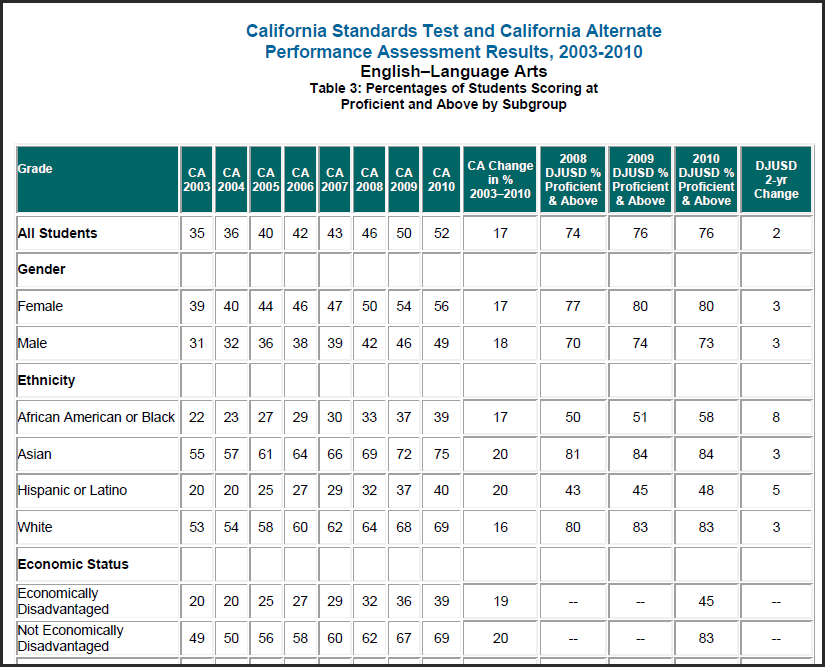

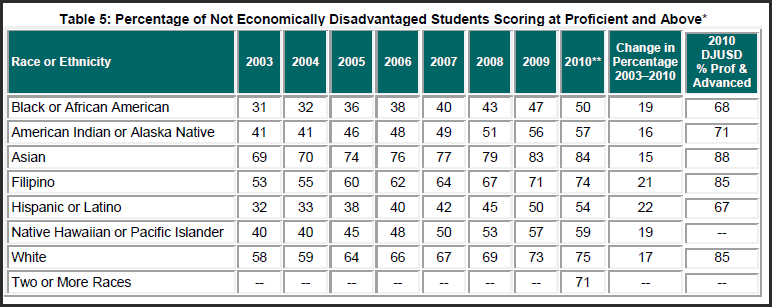
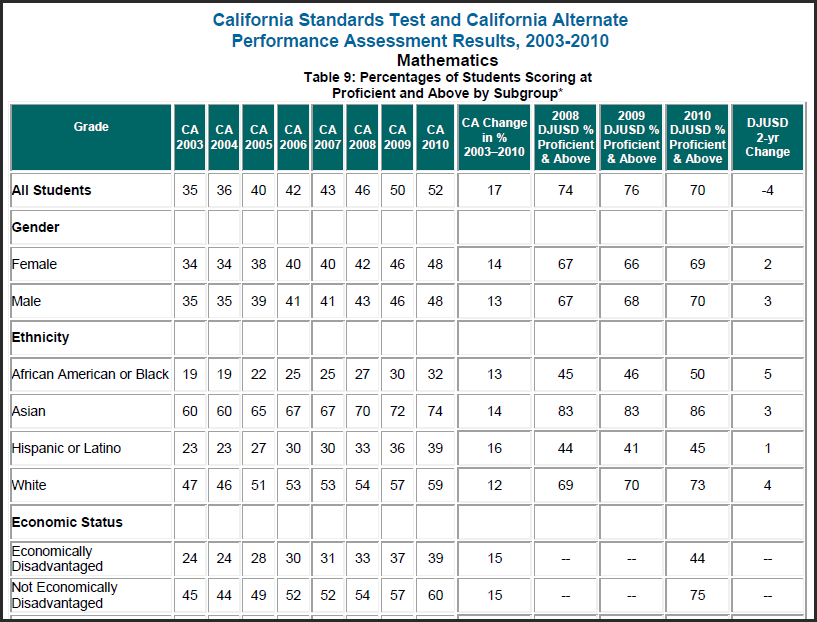
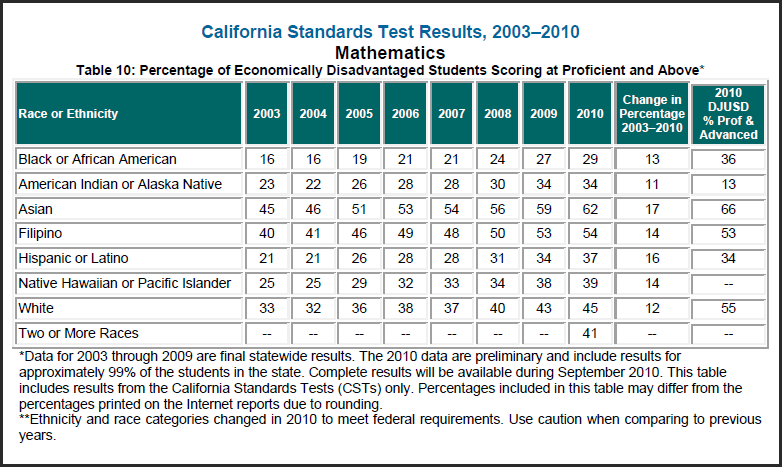
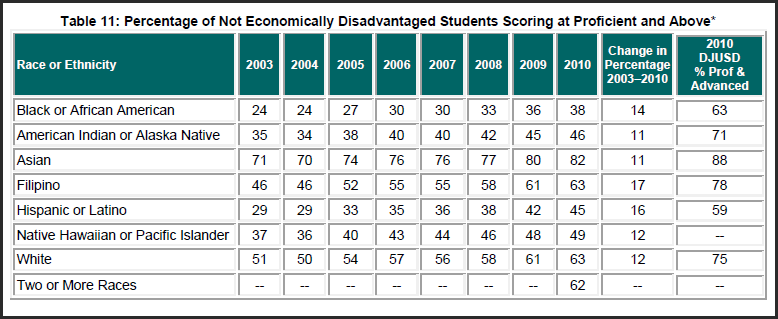




[quote]… the Achievement Gap still remained strong, as Asians and Whites scored dramatically better than their white counterparts.[/quote]
Huh? “whites beating whites”? And, so are we going back to “whites” and “blacks” and “colored” and maybe even the “N-word”? I had hoped for better, particularly after the commentary on 911.
I guess some people still need to play the “race” card…
Obviously that was a typo. But I’m not sure of the rest of your point here. Are you suggesting we should ignore racial differences in scores, even when they are significant and exist above and beyond the measurement of socio-economic status?
No… we need to develop [u]every[/u] child to their highest potential, [u]regardless of[/u] race, creed, physical or mental or emotional status. That is how we survive as a “race”… the HUMAN RACE… I am very tired of having to defend my “being white”… my great-great grandfather and his brother ran a ‘stop’ on the underground railroad that led to emancipation of “black” slaves. I was attacked by a “black”, the day after Martin Luther King Jr. was assassinated… I was ‘rescued’ by one of my favorite teachers, who was “black”… I lived thru the assassinations of three of my childhood heroes… two Kennedy’s, & Dr. King…
Please focus on the children… there are those who focus on race more than the true issues… I hope you are not one of them. I was lucky… I had parents who were “color-blind”… I believe that based on my childrens’ associations, they are, too… yes, past racism still shows up in economic conditions… yes, past messages to minorities told them they were “victims” and some adopted a ‘victim mentality’ where it wasn’t their responsibility, but something to blame the “whiteys” for… and demand restitution w/o taking on their own responsibility… that said, so many “minority” folks have stood up for their rights, took the initiative to make their children’s lives better… reading to them… nurturing them, loving them… giving them a feeling of self-worth…
We need to focus our resources on passing on the best of us… education, morals, dreams… to the children… focusing on “race” doesn’t seem to forward that, IMHO…
The statistics show that this is about race at least in part, how does ignoring that help us solve the problem?
Here’s the online source for STAR test scores, 2010 and before:
http://star.cde.ca.gov/
I think one surprising finding is that in Davis there is no gender gap in math which is fairly remarkable and noteworthy.
Nor does it appear that there is a gender gap in math for the state, as defined by % scoring proficient or above. I would be interested to see the distribution by gender for those students scoring less than proficient or above in the lower three categories.
It would probably be interesting to look at achievement gap by grade level. Does the achievement gap start or widen at particular grades?
[u]IF[/u] it is about ‘race’ (other than the human race), it is by definition, insolvable… that would make it ‘genetic’… I don’t believe that we can’t ‘solve’ this, with enough effort… my take is that we need to identify those students who struggle… enlist the parents to help… use resources (as we can) to intervene when students aren’t progressing/going sideways… you ask, [quote]this is about race at least in part, how does ignoring that help us solve the problem? [/quote]
I ask, how does identifying it as “racial” solve the problem? If you re-read my earlier post, without a predisposition to argue, you’ll see the “answer” (at least as I believe)… teach, love, nurture. I think, with the right motivations, we can improve the situation. But I’m a stupid “white”, so what do I know…
A recent article getting a lot of mention is by columnist Robert Samuelson, who proposes that school reform efforts of the past few decades have failed because it doesn’t address that the fundamental problem is that students aren’t motivated, and not necessarily that it’s the teachers’ fault:
[url]http://www.dispatch.com/live/content/editorials/stories/2010/09/05/student-motivation-is-at-root-of-educational-woe.html?sid=101[/url]
No personal opinion on the matter, just an interesting angle.
I think it even more telling to scrutinize the very real division at Davis Senior High School between the educational/life-skills opportunities afforded AAP (and other very motivated students), and those students who are less-motivated or with learning disabilities. The attitude of the administrative staff I dealt with while trying to sort out behavioral problems my son was having, which correlated with his academic problems, was extremely disappointing. They simply weren’t aware, didn’t care actually, that he was skipping school on a regular basis. And he knew they didn’t care, so the behaviors escalated until his RSP teacher finally advised me of the situation.
At DSHS, I don’t think the issue is race, although my son is black, as much as it is that kids who don’t excel in class just don’t really matter to the administration. Those kids just pull down all the important markers of the school’s success. Some of the teachers are great, but they are bound by an elitist administration. That attitude would have negatively impacted my son’s future had I kept him at DSHS until graduation.
So I think the real culprit here is a system that just wants to get rid of kids who pull the district’s scores down, so they let them fall through the cracks and hope no one notices it. At DSHS, the divide between students isn’t really race, it’s a culture of academic elitism that’s to blame.
dmg: “The statistics show that this is about race at least in part, how does ignoring that help us solve the problem?”
I don’t think you can conclude that the achievement gap is about race, as much as it is about economic status, which makes sense. The following discussion may be “unpopular” with some folks, but it is founded on common sense.
*Parents in the lower economic strata are not as likely to be college educated themselves. (Not everyone is cut out to be a rocket scientist.) This very well may be because these parents have lower intelligence levels than those who are college educated. If the parents do have lower intelligence levels that would keep them from learning as well as is optimal, so their children are apt to have lower intelligence levels that hinder their ability to learn well.
*If one is from a lower economic strata, often mom and dad work two or more jobs to make ends meet, are constantly worried about how to pay rent, and may not have the time to deal with Johnny or Jane’s homework or school issues.
*In homes from a lower economic strata, there may not be an emphasis on education as being all that important. Parent expectations may be much lower in terms of educational achievement.
*Those children expected to go to college are much more likely to be supported at home in terms of parents supplementing what the school teaches, and what the school teaches at times is woefully inadequate.
That said, what the schools should be providing is equal opportunity for all students to excel to the best of their ability. After that, it has to be up to each individual student. But when schools are teaching all sorts of students from various backgrounds, it is important that schools provide for the needs of the learning disabled in particular, or those whose second language is English. Those who have difficulty learning need the most help. Yet I can tell you from personal experience, the learning disabled often get the short end of the stick in the public school system.
I would also add, in my experince, the best way to teach kids is to give them the material in small doses, drill constantly on the basics, and make sure to vigilantly make sure every student believes s/he can succeed. So many students, especially those who have some kind of learning bloc, get shoved aside by the school system, become frustrated, internalize the rejection, and begin to believe they are stupid and cannot learn. Just about every student can learn the basics, with enough patience and understanding from teachers and an administration committed to teaching every student the 3 R’s.
Just to share, when I first started teaching, I had no credentials, only a Bachelor’s and Master’s degree in Math. I was hired as an 8th grade Science teacher right out of college, bc the school was desperate and I was looking for work. Their Science teacher had taken off to parts unknown to be with a boyfriend, so the school was left with no Science teacher at the 11th hour. The first thing that happened to me, when I took the job, was the “team leader” (also a teacher) I would be working with came to my house with a folder full of student records of those she believed were a waste of time to teach. I ignored this well-intentioned but misguided woman, and assumed nothing about any of my students. As far as I was concerned, every student came to me with a blank slate and a fresh start.
Teaching students who are learning disabled or have difficulty learning can be one of the most rewarding experiences a teacher can have. These students are so appreciative when a teacher takes the time and effort to give them the little extra these students need to succeed.
“The one area where the gap is closing is only for blacks and only in math. Assistant Superintendent Clark Bryant, who oversees curriculum and instruction for the Davis school district could not explain why that was the case.“
“Why is that gap there? There are many theories, but no definitive answers.”
If you can’t determine the cause, you can’t propose a solution.
So every school district needs to
— provide equal opportunity for all students;
— identify lower-achieving students regardless of race, ethnicity, or gender and try to provide added support.
There’s probably little point in gathering data on performance by race or ethnicity (though I am sure the district will continue to do so, and we’ll keep having these discussions indefinitely). The question is how to help lower-performing students achieve better outcomes.
Placement was the key with my kids; GATE, special-ed, independent study were all useful options. Increased parental involvement, IMO, is the only thing likely to yield better results, and it isn’t necessary to have high income to be more involved in your kids’ education.
“I don’t think you can conclude that the achievement gap is about race, as much as it is about economic status, which makes sense.”
Except that the stats don’t bear your assertion out. Table 11 and Table 5 show conclusively that the racial gap exists even among people at higher levels of socioeconomic status which incorporate of course those better educated. Previously I have seen stats from the district showing that the racial gap holds even when only comparing kids of college educated parents across races. I think your point is undermined by the data.
hpierce: I don’t know why you are getting so defensive here, I have no idea what race you are, other than your claims here. All I’m saying is that the data suggests, not proves, but suggests this is a racial problem that we need to look at. I’m fine with your approach, but if that were the solution, we would no longer have a problem.
WDF: I have the data by grade, I think you raise a good point that I will look at later this week.
winelady: I would like to look into those issues, I think you raise important concerns that need more exploration.
“Increased parental involvement, IMO, is the only thing likely to yield better results, and it isn’t necessary to have high income to be more involved in your kids’ education.”
Don, you hit the nail on the head. Kids need that push that parents provide and unfortunately many blacks have fragmented families.
Rusty: Can you show me evidence that would demonstrate that blacks with the same economic status as whites have more fragmented families? I question whether you really understand what these data are showing, again look specifically at Table 5 and 11 and explain how you come to the statement that you have made.
What opportunities are provided to AAP students that are not available to all other students?
[quote]There’s probably little point in gathering data on performance by race or ethnicity (though I am sure the district will continue to do so, and we’ll keep having these discussions indefinitely). The question is how to help lower-performing students achieve better outcomes. [/quote]
I don’t think we can answer that unless we know why there is such a difference between the children of African American college educated people versus the children of white or Asian college educated people. Why are so many of these lower-performing students ethnic and racial minorities? I understand this is an uncomfortable question, but to me it is at the heart of these data. You cannot explain this away by claiming socio-economic. You cannot on the face of it explain it be families putting lower expectations on their children. You can’t explain it away I don’t think by saying it’s involvement, maybe it is, but then you are left to explain why college achieving parents who are black would be less involved than their white counterparts, and again, we don’t have data to substantiate that claim. I intentionally asked for these data because they eliminate the ordinary explanations that the difference isn’t racial. Well now I don’t find any way the difference cannot be racial.
It can’t be explained. That is the problem. It doesn’t matter if it is an uncomfortable question. There is no definitive way to say why you have these results by racial or ethnic category. Thus all people can do is speculate, and the speculations will likely arise from an individual’s predispositions about race and culture.
So rather than spin your wheels trying to answer the unanswerable, I’d suggest the focus be on solutions to low achievement: identifying lower performers and working to get them resources and appropriate placement. You can’t craft a solution to low achievement by race, ethnicity, or economic background; that is discriminatory. You can’t identify conscious discrimination by teachers and administrators, I assume. So
What usually happens, unfortunately, is that the problem gets presented as an uneven distribution of resources (GATE, Special Ed, etc.) as if there is a zero-sum budget (criticism of GATE seems to be an annual event in the Davis Enterprise, with a column just in the last week decrying private testing for it). In fact, separate resources are available for students identified as Special Ed. An IEP guarantees considerable support for a low-performing student. As to behavioral problems, there is a truancy policy and the district contacts parents when it is occurring.
Last year Montgomery Elementary (MME) went into Program Improvement (PI). This year it looks like MME will stay in PI, and that Davis High School will join them going into PI. DHS reached its schoolwide target, but fell short in its target for Socioeconomically Disadvantaged students.
I believe this link will give a summary for DJUSD schools:
[url]http://api.cde.ca.gov/AcntRpt2010/2010GrthAPIDst.aspx?cYear=2005-06&allcds=5772678&cChoice=2004BApiD[/url]
DSHS does NOT notify parents directly when a student has an unverified absence, or even many unverified absences (37, to be exact). They have a new system that requires parents to log-in to a website to find out if their child is attending classes. And, an IEP does NOT guarantee “considerable support” for a low-performing student. It just guarantees a paper-trail at the high school level. Perhaps you should check your facts before you assume knowledge you don’t have.
All other Davis schools avoided PI, which surprised me; I was anticipating worse. Right now DJUSD schools are most vulnerable to falling into PI when a subgroup doesn’t meet their improvement targets. In part subgroups at many other schools are statistically small enough as to not count in the regulations.
I am impressed that Hispanic/latinos and socio-economically disadvantaged students are making their improvement targets at all three JH campuses. So if there is something good happening at those sites, then maybe it will work its way up to improvement at DHS.
Harper JH may be the most vulnerable in this regard, because they have the largest number of SE students as well as Hispanic/latinos. Marguerite Montgomery Elementary is also a feeder school to Harper JH.
DSHS does NOT notify parents directly when a student has an unverified absence, or even many unverified absences (37, to be exact).
I received a phone recording for every unverified absence, starting with the first.
Correction:
DHS will not be in PI, because it isn’t currently a Title I-funded school.
[url]http://www.cde.ca.gov/ta/ac/ti/programimprov.asp[/url]:
In California, PI is the formal designation for Title I-funded schools and LEAs that fail to make AYP for two consecutive years.
winelady:
I am speaking from considerable experience with IEP. As you know, it gives you, the parent, the ability to force changes in the child’s placement and to mandate special provisions in his/her learning environment. I found the counselors and IEP teachers to be very helpful allies when there was a problem. The quarterly meetings were very useful in identifying problems that were developing. What was necessary, though, was to press hard for a change in placement if appropriate, because there is a tendency to just track the kids into existing programs.
As to truancy, my experience with that is a few years old. At the time, an automatic phone call was generated for each absence. How your child could get 37 unverified absences without you knowing about it is a good question. Sounds to me that the system has gotten worse, not better, in spite of all the brouhaha a couple of years ago when they announced a new truancy policy.
What I find disturbing is your accusation of elitism against administrators. Perhaps you could be more specific about how they were unresponsive. I found them sympathetic and moderately helpful, but it took persistence to get my child from junior high into DSIS.
As to truancy, my experience with that is a few years old. At the time, an automatic phone call was generated for each absence. How your child could get 37 unverified absences without you knowing about it is a good question. Sounds to me that the system has gotten worse, not better, in spite of all the brouhaha a couple of years ago when they announced a new truancy policy.
My experience was through DHS last year, and it generated an automatic phone call each time. The district loses money for absent students, so I would expect the district to be on top of this, especially since it does affect the ability to keep teachers. This blog even highlighted Bob Dunning’s annoyance on the issue:
[url]http://davisvanguard.org/index.php?option=com_content&view=article&id=3326:school-district-responds-to-dunning-column-on-truancy&catid=67:education&Itemid=120[/url]
[i]”Clearly then, in regards to English, there are two gaps, an economic gap and a racial gap. And the surprising aspect is that even controlling for economics, the race and ethnicity gap remains, and in fact is even stronger.”[/i]
If nothing else, there are certainly cultural gaps. My guess is that if you randomly took black children and had them reared in Chinese-American households and you took racially Chinese children and had them randomly assigned to grow up in African-American households you would find much lower scores for the yellow-skinned kids and much higher scores for the black kids.
Moreover, you could find the same kinds of gaps if you took Hmong kids and switched them out with Japanese. The Hmong culture stresses educational success much less than the Japanese culture. The “race” of the kids in both instances is the same. But one has a superior culture when it comes to educational performance.
You could find this kind of a gap among various white groups. Jews are “smarter” than every other white ethnicity, even if they are the same “race.” So raise the children born to Jewish parents in a typical WASP family in Georgia and their test scores would drop. Take kids born into a WASP family from the South and have them raised by educationally superior Jewish parents and those kids would score much higher than their relatives in the South.
And with “black” kids this is true, too: the black children of African immigrants and blacks from some Caribbean islands do much better in school than the children of African-Americans on average. Why? Better and worse cultural norms and expectations.
Though he was not raised by his father, my guess is that one of the reasons Barack Obama achieved so much success in school was that his family had very high expectations of him. In general, our society and a large percentage of African-American families–which, most often, usually means a single, uneducated mother–have low expectations of black children in school. And the kids rise to that level of expectation. If the cultural norms changed and we all expected more from black kids (or Latinos or others whose groups tend to perform poorly) the children’s performance on the whole would rise to our new, higher level of expectation. However, those of us outside of families cannot change the truth inside those families: that’s where the low expectations begin.
The reason asians do so well academically is that in mmany asian cultures academic success is the key to everything. In most 3rd world countries success in academics is the only road that will get you out of a life of extreme poverty. This is especially true in recent immigrant families. I have also had Ethiopian immigrant co-workers and the emphasis on academics was also striking. It seems that after a couple of generations many immigrant groups internalize american mediocrity as their norm.
My wife is Chinese and I have met many of her friends and relatives who sacrifice everything for their children’s education. The total emphasis on academics is quite amazing. No sports, part time job, or anything else that might take time away from academics. My teenage stepdaughter said that among her asian friends they have a term called “asian fail” which is anything less than a perfect score of 100% on a test/paper/assignment.
Rifkin :”You could find this kind of a gap among various white groups. Jews are “smarter” than every other white ethnicity, even if they are the same “race.” ‘
Foundation Please! Oh and this is just one of the many nonsense things in your post.
Musser:*Parents in the lower economic strata are not as likely to be college educated themselves. (Not everyone is cut out to be a rocket scientist.) This very well may be because these parents have lower intelligence levels than those who are college educated. If the parents do have lower intelligence levels that would keep them from learning as well as is optimal, so their children are apt to have lower intelligence levels that hinder their ability to learn well.
Foundation Please!
The state breaking down the numbers by race really brings out the biases. How about the disparity between white teachers and black and latino teachers? Nobody brought up role models something so important to children that the test score gap exists even in Davis where the value of education is so great it can be calculated into the price of housing.
Toad: I’m still struck by the fact that people have seemed to ignore the fact that two of the charts controlled for LES and SES.
I don’t think you can conclude that the achievement gap is about race, as much as it is about economic status, which makes sense.
Maybe, but if I remember correctly, there was a study done a few years ago at DHS that determined that students of color (African Americans and Hispanic/Latino students, specifically) were likelier to receive harsher discipline for the same infractions as their white & Asian counterparts. When a follow up study was done a couple of years later, the results shows more equity in the matter.
It suggests that there is a plausible basis for considering racial bias in the system. In the case of academic achievement, it might be harder to pin down such bias (if it exists) than was the case for student discipline.
RIFKIN: [i]”Jews are “smarter” than every other white ethnicity, even if they are the same “race.”[/i]
TOAD: [i]Foundation Please![/i]
Toad, I have no idea what it is you don’t understand. I thought this was common knowledge. Based on IQ metrics, SAT scores, LSATs, MCATs, GREs, academic achievement and every other measure, it’s not even close. Here is a primer on the topic ([url]http://homepage.mac.com/harpend/.Public/AshkenaziIQ.jbiosocsci.pdf[/url]) if you really don’t understand the subject.
Wesley: [i]”The total emphasis (among some Asians) on academics is quite amazing. No sports, part time job, or anything else that might take time away from academics.”[/i]
I’m sure what you are speaking to is your experience and it might be more representative than my experience. That said, all of my childhood Asian friends in Davis played sports and many spent hours every day practicing classical instruments. A Japanese friend of mine in high school was “too good” to play in the DHS orchestra, which then was deemed the best high school orchestra in the USA. Most also worked part-time jobs in high school, and still did great academically. I think in my graduating class at Davis High in 1982, where certainly less than 10% of the kids were Asians, they made up about 75% of the top 50 graduates (out of a class of 512).
Musser:”Parents in the lower economic strata are not as likely to be college educated themselves. (Not everyone is cut out to be a rocket scientist.) This very well may be because these parents have lower intelligence levels than those who are college educated. If the parents do have lower intelligence levels that would keep them from learning as well as is optimal, so their children are apt to have lower intelligence levels that hinder their ability to learn well.”
Mr. Toad: “Foundation Please!”
Common sense will tell you this! I fail to understand why you find this doubtful! Why in heaven’s name would someone in general with a college degree take on a low paying job at McDonald’s (unless there are exceptional circumstances such as the current recession)? How could someone with a low IQ obtain a job as a scientist? Most people with low paying jobs are not there by choice!
dmg: “Except that the stats don’t bear your assertion out. Table 11 and Table 5 show conclusively that the racial gap exists even among people at higher levels of socioeconomic status which incorporate of course those better educated. Previously I have seen stats from the district showing that the racial gap holds even when only comparing kids of college educated parents across races. I think your point is undermined by the data.”
Your conclusions as to why there is a “race gap” and how the schools can somehow fix it? Inordinate amounts of money are being spent on something that is nebulous at best, when it is obvious the best thing a school can do is make sure to give kids with learning problems the most attention regardless of race. What if we were able to prove definitively that Asians are smarter than whites, and is the reason Asians score higher on tests? How is that knowledge going to help underachieving whites? Unless you can point to actual bias on the part of teachers, and I very much doubt that you can in this day and age, discovering the reasons for the “race gap” is fruitless and expends needless amounts of energy and money chasing down the wind.
Try doing what is right in front of your face – demand the schools provide basics in a straightforward manner; with lots of drill; and provide plenty of resources to learning disabled kids and those who have language barriers. Why is that so hard to understand? Excuse my frustration, but the “race card” has been played way to often, and bc of that, it gets tuned out and turned off – and covers up the real underlying problems that are occurring in our schools (and even covers up racism when it does exist). Our learning disabled students and those whose second language is English are getting short shrift in our public schools, which needs to stop. And our administrations have got to start supporting teachers in taking care of discipline problems in the classroom. Now I’ll get off my soapbox and try to calm my ruffled feathers…argggghhhh!
Oh, and by the way, we now have a African-American Supt of School in Davis, but I very much doubt he is going to be able to solve the alleged “racial gap” either… What I hope he is able to do is to make sure more is done for the learning disabled/ESL students…and never mind the GATE program, which seems to get all the attention.
“Your conclusions as to why there is a “race gap” and how the schools can somehow fix it?”
If I could figure that out, I would have a very different than I do now. I just don’t think there is one easy answer. BUT, you start addressing the problem by acknowledging there is a problem and the stats are very clear here. There is a SES gap but even controlling for SES, the race gap does not disappear and in fact widens. That should be ALARMING and people have spent two days trying to deny it.
“Inordinate amounts of money are being spent on something that is nebulous at best, when it is obvious the best thing a school can do is make sure to give kids with learning problems the most attention regardless of race.”
I don’t think we’re talking about people with learning problems. Again, until we figure out the problem, I think your firing randomly trying to create solutions.
“What if we were able to prove definitively that Asians are smarter than whites, and is the reason Asians score higher on tests?”
I don’t suspect that is a real possibility so your following answer is basically a strawman argument.
“Unless you can point to actual bias on the part of teachers, and I very much doubt that you can in this day and age, discovering the reasons for the “race gap” is fruitless and expends needless amounts of energy and money chasing down the wind. “
This is the real problem I have, the assumption that statistics are not showing something real. There needs to be actual bias? I mean we’ve looked into unconscious bias training and things of that sort, but again I think you are asking the wrong questions and then offering overly simplistic blanket solutions that probably do not solve the problem and at the very least we won’t know it until we know what the actual problem is.
To me there is enough data here over a long enough period of time that we need to figure out what the problem is and then figure out how to address it. Until we do that, we’re shooting in the dark or spitting in the wind, pick your cliched metaphor.
“…we need to figure out what the problem is…”
You won’t.
“…and then figure out how to address it.”
Therefore, you won’t.
Musser: Our learning disabled students and those whose second language is English are getting short shrift in our public schools, which needs to stop.
In the past few years we used district resources for learning disabled students and also for ELL and were mostly satisfied with it all. I really don’t have anything to compare with, but I didn’t note “short shrift.”
dmg: “I don’t think we’re talking about people with learning problems. Again, until we figure out the problem, I think your firing randomly trying to create solutions.”
My “random solutions” are tried and true methods that actually worked very well. I used to be a public school math and science teacher, and junior college instructor as well as a tutor.
dmg: “To me there is enough data here over a long enough period of time that we need to figure out what the problem is and then figure out how to address it. Until we do that, we’re shooting in the dark or spitting in the wind, pick your cliched metaphor.”
Excuse me, but I’m not “shooting in the dark” nor spitting in the wind”. My methods may seem simplistic, but guess what, they worked very well. Well enough so that almost 100% of my 8th grade students scored high enough on a pre-Algebra test to outshine all the other math teachers’ students, despite the fact they were given the brighter students. Well enough so that students in my junior college would wait until I was the proctor in the Math lab, so that students were lined up out the door and down the hall. Well enough so that a 7th grade student who was so far behind in math she was flunking, yet after I tutored her she ended up near the top of her class. Good teachers are out there, but they do not get the support or accolades they need to fight an entrenched system that rewards mediocrity, punishes excellent teachers, does not support teachers when it comes to student discipline, and the list goes on. I KNOW OF WHAT I SPEAK…
The reasons for murder are as varied as the number of individuals who commit it, but we still have murders. How much time and energy do you want our school system to waste on finding reasons for the “achievement gap based on race”? I’m more interested in finding reasons for the “achievement gap” period, and make sure we bring all students up to a certain standard. There are tried and true methods of doing that, but they are not PC at the moment. Not to put too fine a point on it, “spoon feed in small bites and drill, drill, drill while along the way making students believe, believe, believe they can succeed”. It does work, trust me… but it is not being used.
wdf1: “In the past few years we used district resources for learning disabled students and also for ELL and were mostly satisfied with it all. I really don’t have anything to compare with, but I didn’t note “short shrift.”
It was not until my child got to junior college that my child was diagnosed with a learning disability; and not until my child got to UCD before my child was finally, officially and specifically diagnosed with dyslexia. The public school system in Davis was pathetically inadequate at that time. You have indicated things have changed since then (my child graduated DHS in 1998, which was 12 years ago. Questions: Will they now actually and adequately test a student for learning disablities or pay for one? If a specific learning disability is found, will they provide special training to assist that student? Or do they put them in Transition Academy when they reach DHS, with all the other trouble makers; assign them a “reading teacher”, who does as best s/he can not having specific training for specific learning disabilities; and the school ignores the bullying that goes on in Transition Academy bc of the dysfunctional mix of different types of students? And just how helpful are the counselors in troubled situations involving learning disabled students, or are they more interested in students bound for college? And since the best ESL program at Valley Oak was discontinued, how has that worked out for ESL students? Do the learning disabled students have their own programs/ schools that successfully cater to them like GATE or DaVinci students? Just asking…
[quote]My “random solutions” are tried and true methods that actually worked very well. I used to be a public school math and science teacher, and junior college instructor as well as a tutor. [/quote]
I suspect if your tried and true methods worked as well as you claimed, they would be done and this would be a non-issue. I live by the maxim, if it were easy, anybody could do it. The reality is that things are rarely that simple and easy to solve despite what we would like to believe.
dmg: “I suspect if your tried and true methods worked as well as you claimed, they would be done and this would be a non-issue.”
Well, you would be wrong. There are reasons why these methods are not being used in the schools. One big reason has to do with textbooks. The fact of the matter is, if tried and true methods were used, there would be no need for new textbooks all the time, a multi-million dollar industry. College professors would have nothing new to produce in the way of research either. This is only one of a myriad number of reasons the old tried and true methods are not being utilized…and many teachers are extremely frustrated because of these entrenched roadblocks to straightforward and successful learning. I had to teach all three of my kids phonics because the schools at the time were using the see/say method. Egads…
I’m sure those techniques work well for some students and not for others, just as phonics works for some students while whole language works for others. The key is to fit the learning style to the student. If a student isn’t achieving, that’s one thing to look at. My kids were different in their abilities and how they responded to different teaching techniques. You’re not going to find one single approach that increases performance across the board.
That argument doesn’t make sense Elaine. First in history and science you need to have constantly changing books as they get out of date. In math and english, it’s simply a matter of wear and tear. I don’t think our school district gets new text books very often. Maybe WDF can answer that more definitively, but I think it’s been a number of years.
In math and english, it’s simply a matter of wear and tear.
I remember some pretty heated battles over the years about changing the teaching approaches in both math and english.
Don Shor: “I remember some pretty heated battles over the years about changing the teaching approaches in both math and english.”
Exactly. And so much of it is driven by the desire to produce new “research” and publish it in new textbooks to sell to schools. As my grandmother used to say, “it’s a racket”!
Don Shor: “I’m sure those techniques work well for some students and not for others, just as phonics works for some students while whole language works for others. The key is to fit the learning style to the student. If a student isn’t achieving, that’s one thing to look at. My kids were different in their abilities and how they responded to different teaching techniques. You’re not going to find one single approach that increases performance across the board.”
Phonics works for almost every kid, including those who are dyslexic. I’ve tried it on dyslexics (tutoring). It teaches students how to sound out words, so that recognition is possible even if the student cannot “read” the word by sight. This business about “one single approach doesn’t always work” is not necessarily true in some areas of teaching, especially the basics. For instance, drilling students in the math tables is another method that is extremely effective, much like phonics. If you know the basic building blocks cold, the rest comes so much more easily. If you don’t know those basic building blocks cold, then everything becomes difficult. I’ve tutored elementary school kids, junior high kids, high school kids, junior high kids. I’ve taught junior high school kids and junior college kids. I do know of what I speak. The results from my students proved my points over and over again, to the consternation and embarrassment of the other instructors. I know I am not the only teacher out there that is aware of this, but we are outgunned by bigger forces at work, such as the textbook industry…
dmg: “That argument doesn’t make sense Elaine. First in history and science you need to have constantly changing books as they get out of date. In math and english, it’s simply a matter of wear and tear.”
You are not getting how the system works. There is a push for “new math” for instance, which will require a whole new curriculum. The school will say, “well, we cannot afford new texts right now”. The textbook company will say “well, I’ll tell you what, how about if we just sell you the new curriculum, and when you get the money, you can pay for new texts”. Well with a deal like that, how can the school pass it up. And before a year or two has gone by, new textbooks are purchased to go with the new curriculum. Or the textbook company will introduce a new curriculum using a new “game” they devise, or new “worksheets”. They have more gimmicks than a dog has hairs!
The other part that drives this is research in colleges. 1) Ask current students at DHS how many of their texts were written by UCD professors. 2) Somebody has to come up with the new fangled idea that is going to force the schools to decide to get a whole new set of textbooks. 3) College professors in education have to have something new to research, to publish, in order to maintain tenure.
Are you beginning to get the picture of how insidious this system is?
There was a push for “new math” like 25 years ago that has long since been abandoned. I’m sure someone can tell us when the last time the district had new math books or curriculum, I’m guessing at least ten years.
This chart shows the year recent curriculum was adopted.
[url]http://www.djusd.net/learn/instruction/ci/K-8 Core Curriculum.pdf[/url]
English/Language Arts: 2003
History/Social Studies: 2006-7
Math: 2008-9.
The district has ongoing curriculum committees that review new textbooks and replaces them all the time. In 2009 DJUSD spent $352,000 on curriculum and approved textbooks, and $68,000 on books and other reference materials. Note that they have slashed that budget for 2010-11 by 94% and 74% respectively.
“Phonics works for almost every kid, including those who are dyslexic.”
Phonics worked great for my daughter. Whole language was much better for my son; phonics was pointlessly boring for him. In almost every respect my kids were opposite with regard to the ‘best’ approach. However, for math and foreign language I absolutely agree with you.